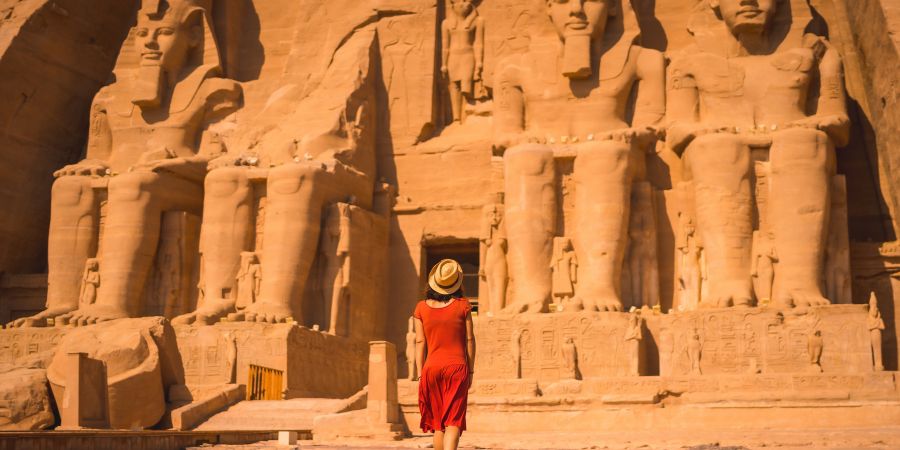$798$5,195

Egypt, a country linking northeast Africa with the Middle East, dates back to the time of the pharaohs. Known for its ancient monuments, the Nile River, vast deserts, and rich history, Egypt is a captivating destination for travelers seeking to explore one of the world’s oldest civilizations.
Geography and Climate
Egypt is predominantly desert, with the Nile River running from south to north. The Sinai Peninsula, a land bridge to Asia, is a mountainous region. Egypt’s climate is desert, hot and dry, with more moderate temperatures along the Mediterranean coast.
Cultural Overview
Egypt’s culture is a unique blend of antiquity and modernity, influenced by the legacy of ancient Egypt, Greek, Roman, Coptic, and Islamic civilizations. The country is also known for its contributions to literature, art, music, and cinema in the Arab world.
Key Destinations
- Cairo – The capital city, known for the Giza pyramid complex and the Egyptian Museum, which houses an extensive collection of ancient artifacts.
- Luxor – Often called the world’s greatest open-air museum, Luxor is home to the Valley of the Kings, Karnak Temple, and Luxor Temple.
- Aswan – Known for its beautiful Nile scenery, significant archaeological sites, and the Aswan High Dam.
- Alexandria – A Mediterranean port city, famous for its Greco-Roman landmarks, beautiful beaches, and the Bibliotheca Alexandrina.
- Sharm El Sheikh – A resort town on the Sinai Peninsula, known for its sandy beaches, clear waters, and coral reefs.
- Hurghada – A Red Sea resort town, popular for scuba diving, snorkeling, and its vibrant nightlife.
Ancient Monuments and Archaeology
Egypt’s ancient monuments, many of which are UNESCO World Heritage Sites, are a major draw. Highlights include the Pyramids of Giza, the Sphinx, the temples of Luxor and Karnak, and the ancient tombs in the Valley of the Kings.
Nile River Cruises
A cruise on the Nile River is a quintessential Egyptian experience. These cruises often travel between Luxor and Aswan, offering a relaxing way to see many of Egypt’s most significant archaeological sites.
Beaches and Water Activities
Egypt’s Red Sea coast is world-renowned for its crystal-clear waters, vibrant coral reefs, and abundant marine life, making it a hotspot for divers and snorkelers. Beach resorts like Sharm El Sheikh and Hurghada offer a plethora of water sports and leisure activities.
Egyptian Cuisine
Egyptian cuisine combines Middle Eastern and Mediterranean flavors. Popular dishes include ful medames (stewed beans), koshari (a rice, lentil, and pasta dish), and traditional flatbread. Tea is the national drink, often served sweet and strong.
Shopping and Handicrafts
Egypt is famous for its bazaars and souks, where you can find everything from spices and textiles to gold jewelry and handcrafted souvenirs. The Khan El Khalili market in Cairo is a must-visit for shoppers.
Arts and Entertainment
Egypt has a rich tradition in arts, particularly in cinema, music, and dance. Cairo is considered the Hollywood of the Arab world. Traditional Egyptian belly dancing and folk music are also integral parts of the country’s cultural heritage.
Best Time to Visit
The best time to visit Egypt is from October to April when the weather is cooler but still sunny. This period is ideal for exploring ancient sites and enjoying outdoor activities. Summers can be extremely hot, especially in the desert and southern areas.
Cultural Etiquette
Respect for local customs and traditions is important. Dress conservatively, especially when visiting religious sites. Greetings are generally formal, with a handshake being the common form.
Safety
Egypt is generally safe for tourists, but it’s advisable to stay informed about the current situation and to follow travel advice from reliable sources. Standard precautions should be taken, especially in crowded tourist areas.
Transportation
Egypt has a well-developed transportation infrastructure, including internal flights connecting major cities, a comprehensive rail network, and buses. In cities, taxis and rideshare services are widely available.
Accommodation
Egypt offers a range of accommodation options, from luxury resorts in tourist areas like the Red Sea coast to budget-friendly hostels in major cities. Traditional guesthouses and boutique hotels offer a more local experience.
Language
Arabic is the official language, with Egyptian Arabic being the most widely spoken dialect. English and, to a lesser extent, French are spoken in tourist areas.
Religion
The majority of Egyptians are Muslim, and Islam plays a central role in daily life. Coptic Christians form a significant minority. Visitors should respect religious customs, especially during the holy month of Ramadan.
Festivals and Events
Egypt hosts numerous cultural and religious festivals, including Ramadan, Eid al-Fitr, and the Coptic Christmas. The Cairo International Film Festival and the Sphinx Festival are notable cultural events.
Tips for Travelers
- Bargaining is common in markets and bazaars.
- It’s advisable to carry bottled water to avoid dehydration.
- Be cautious with street food to avoid stomach issues.
- Photography in certain archaeological sites and museums may require a permit or be subject to a fee.